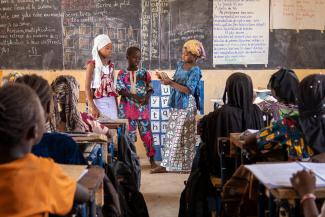For Immediate Release
Press Release
Bamako, Mali – The United States government (USG) announces the new $36 million early-grade reading and mathematics project in Bamako, Koulikoro, Segou, and Sikasso titled USAID Doniya Taabolo (2023-2028). This new project will focus on reading and writing in Bamanankan language for level 2 (Grade 3 and 4) and mathematics for Level 1 and 2 (Grade 2, 3, and 4). The approach will consolidate and deepen achievements made under the prior United States Agency for International Development (USAID) $54 (around FCFA 21 billion) million USAID Selective integrative Reading (USAID SIRA) project (2016-2022) by improving education quality in 1,000 USG-supported Malian schools. Building on this strong foundation, USAID Doniya Taabolo will expand proven local-language literacy programming to Grade 4 and introduce a primary mathematics program to provide balanced foundational skills and improve overall learning outcomes for primary school students.
"Access to quality primary education opens doors of opportunity giving students the skills and knowledge to build strong futures," stated U.S. Ambassador to Mali Rachna Korhonen.
Mali’s investment in education has improved student achievement. Partnerships with bilateral donors such as USAID to support a national reading framework and an evidence-based literacy approach increased the proportion of children who can read in Bamanankan at the end of Grade 2. In 2015, USAID conducted a baseline survey of Grade 2 students reading skills resulting in 3.6% meeting the national standards. In 2022, the endline survey was conducted at the end of the SIRA project resulting in 17.7% of Grade 2 students demonstrating reading fluency and comprehension by meeting or exceeding national standards. USAID’s decision to maintain this focus on instruction in Bamanankan is based on the assumption that if the balanced literacy approach is integrated into the curriculum, appropriate tools are available in a child’s mother tongue language for all learners’ abilities, educators are adequately trained, and education is made more inclusive, then reading and math skills will improve and the Ministry of National Education (MNE) will have the capacity to replicate these practices.
Drawing on the well-established partnership between Education Development Center (EDC), the MNE, and local school-communities in the four regions, USAID Doniya Taabolo will promote the resilience and adaptability of the Malian education system and enhance local understanding of quality education. Additionally, USAID Doniya Taabolo programming is intended both to be gender-transformative and to meet the needs of learners with disabilities in participating schools, particularly those with auditory or visual disabilities.
The USG is the largest bilateral education donor in Mali and remains committed to supporting quality primary education and positive learning outcomes for Mali’s children through the United States Agency for International Development.
For more information, contact:
Embassy Press Office / ACI 2000 Rue 243 Porte 297 / Bamako, Mali
Tel : 20 70 24 24 /20 70 24 26 / Fax : 20 70 24 79 / Email : PASBamako@state.gov
Embassy: https://ml.usembassy.gov/

